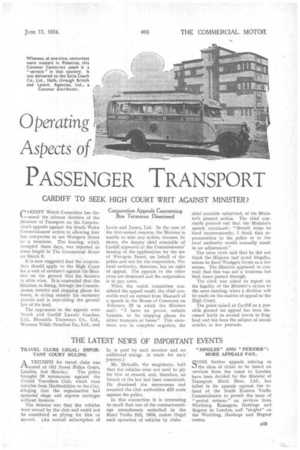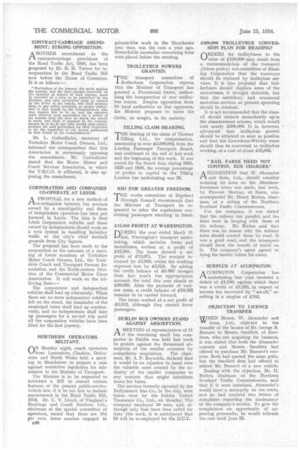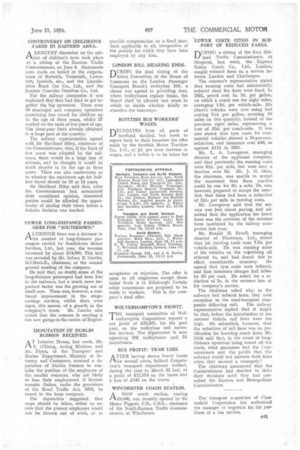THE LATEST NEWS OF IMPORTANT EVENTS
Page 53

Page 54

Page 55

If you've noticed an error in this article please click here to report it so we can fix it.
TRAVEL CLUBS LEGAL: IMPORTANT COURT RULING
A TRIUMPH for travel clubs was fAscored at Old Street Police Court,
London, last Monday. The police brought 20 summonses against the United Travellers Club, which runs vehicles from Hertfordshire to the City, alleging that the organization had operated stage and express carriages without licences.
The defence was that the vehicles were owned by the club and could not be considered as plying for hire or reward. (An annual subscription of is. is paid by each member and an additional charge is made for each journey.) Mr. Metcalfe, the magistrate, held that the vehicles were not used to ply for hire or reward, and, therefore, no breach of the law had been committed. He dismissed the summonses and awarded the club authorities 421 costs against the police.
In this connection it is interesting to recall that one of the contract-carriage amendments embodied in the Road Traffic Bill, 1934, makes illegal such operation of vehicles by clubs. "SINGLES" AND "PERIODS": MORE APPEALS FAIL.
QOME further appeals relating to the class of ticket to be issued on services from the coast to London have been decided by the Minister of Transport. Birch Bros., Ltd., has failed in its appeals against the refusal of the South Eastern Traffic Commissioners to permit the issue of "period returns" on services from Worthing, Ramsgate, Hastings and Bognor to London, and "singles" on the Worthing, Hastings and Bognor routes. CONTRACT-CARRIAGE AMENDMENT: STRONG OPPOSITION.
ANOTHER amendment to the contract-carriage provisions of the Road Traffic Act, 1930, has been proposed by Mr. R. H. Turton for incorporation in the Road Traffic Bill now before the House of Commons. It is as follows:— "Particulars of the journey, the party making the journey, and the total amount receivable by the operator in respect of such tourney, must be recorded on a form to be prescribed by the Minister, and such particulars must be carried by the driver of the vehicle, who shall produce them to any police constable, or person authorized in that behali by the Commissioners, who may require him to do so, and the operator must preserve such particulars for a period of six months from the date on which the record is made, and shall, if required by the Commissioners so to do at, any time during snob period, produce the sal& particulars for their inspection or for the inspection of any person authorized
in m that behalf by the Comissioners,'
Mr. L. Cadwallader, secretary of Yorkshire Motor Coach Owners, Ltd., informed our correspondent that this Association is strenuously opposing the amendment. Mr. Cadwallader stated that the Motor Hirers and Coach Services Association, to which the Y.M.C.O. is affiliated, Is also opposing the amendment.
CORPORATION AND COMPANIES CO-OPERATE AT LEEDS.
A PROPOSAL for a new method of rl.co-ordination between bus services owned by a municipality and those of independent operators has been put forward in Leeds. The idea is that Leeds Corporation vehicles and those owned by independents should work on a rota system in handling Saturday traffic to the city's chief football grounds from City Square.
The proposal has been made to the corporation as the outcome of a meeting of Leeds members of Yorkshire MotorCoach Owners, Ltd., the Yorkshire Coach and Transport Owners Association, and the North-eastern Division of the Commercial Motor Users Association. It will work on the following lines:—
The corporation and independent vehicles shall load up alternately. When there are no more independent vehicles left on the stand, the remainder of the municipal buses shall load up continuously, and no independents shall take up passengers for a second trip until all the corporation vehicles have been filled for the first journey.
NORTHERN OPERATORS MILITANT.
ON Monday night, coach operators from Lancashire, Cheshire, Derbyshire and North Wales held a meeting in Manchester to prepare a case against restrictive legislation for submission to the Minister of Transport.
The Minister is to be requested to introduce a Bill to amend certain features of the present public-servicevehicle law, if it be too late to include amendments in the Road Traffic Bill, 1934. Mr. C. Y. Lloyd, of 'Fingland's Bookings and Coach Stations, Ltd., chairman of the special committee of operators, stated that there are 18i per cent. fewer coaches engaged in MO
private-hire work in the Manchester area than was the case a year ago. Remarkable anomalies concerning fares were placed before the meeting.
TROLLEYBUS POWERS GRANTED.
THE transport committee of Rotherham Corporation reports that the Minister of Transport has granted a Provisional Order, authorizing the inauguration of new trolleybus routes. Despite opposition from 10 local authorities or bus operators, the Minister proposes to make the
Order, as sought, in its entirety. TILLING CLAIM HEARING.
1-11HE hearing of the claim of Thomas 1 Tilling, Ltd., for compensation, amounting to over £3,000,000, from the London Passenger Transport Board, was continued at the end of last week and the beginning of this week. It was stated for the Board that, during 1928, 1929 and 1930, the average percentage of profits to capital in the
London bus undertaking was 36.
BID FOR GREATER FREEDOM.
THE works committee of Deptford
Borough Council recommends that the Minister of Transport be requested to relax the regulations concerning passengers standing in buses.
£15,583 PROFIT AT WARRINGTON.
DURING the year ended March 31 1-"last, Warrington's transport undertaking, which includes trams and motorbuses, worked at a profit of £15,583. The buses showed a net profit of £13,071. The receipts increased by £3,928, whilst the working expenses rose by £3,624. By adding the credit balance of £6,695 brought from last year's bus appropriation account, the total this year stands at £20,065. After the payment of various sums, a credit balance of £10,365 remains to be carried forward.
The trams worked at a net profit of £3,512, although they carried fewer passengers.
DUBLIN BUS OWNERS STAND AGAINST ABSORPTION.
A MEETING of representatives of 11 L-1 of the remaining small bus companies in Dublin was held last week to protest against the threatened absorption of the smaller concerns by compulsory acquisition. The chairman, Mr. A. P. Reynolds, declared that it would be an injustice to hand over the valuable asset created by the industry of the smaller companies to any concern that might substitute trams for buses.
The services formerly operated by the Dollyrnount Bus Co., in the city, were taken over by the Dublin United Tramways Co., Ltd., on Monday. Ths company employed 30 men, and, although only four have been called for duty this week, it is anticipated that 24 will be re-employed by the D.U.T. £200,000 TROLLEYBUS CONVERSION PLAN FOR READING?
ORDERS for trolleybuses to the V./value of £120,000 may result from a recommendation of the transport (future policy) sub-committee of Reading Corporation that the tramways should be replaced by trolleybus services. It is also proposed that trolleybuses should displace some of the motorbuses, if thought desirable, but that the subsidiary and occasional motorbus services at present operating should be retained.
It is not recommended that the council should embark immediately upon the abandonment scheme, which would cost nearly £200,000. It is, however, advocated that trolleybus powers should be obtained so soon as possible and that the Caversham-Whitley route should then be converted to trolleybus working, at a cost of about £15,000.
'RAIL FARES NEED NOT CONTROL BUS CHARGES."
ASUGGESTION that W. Alexander and Sons, Ltd., should consider reducing its fares on the AberdeenInverness route was made, last week, by Provost Mackay, of Nairn, who accompanied Mr. Henry Riches, chairman, at a sitting of the Northern Scotland Traffic Commissioners.
For the company, it was stated that the railway ran parallel, and the fares were in keeping with those of the railway. Mr. Riches said that there was no reason why the railway fares should control those by road. It was a good road, and the ratepayers should have the benefit of travel on it. The company's agent agreed to bring the matter before his client.
SURPLUS AT ACCRINGTON.
ACCRINGTON Corporation bus undertaking last year incurred a deficit of £1,180, against which there was a credit of £1,283, in respect of income tax recovered by "set-off," resulting in a surplus of £103.
OBJECTION TO LICENCE TRANSFER
WHEN Messrs. W. Alexander and "I Sons, Ltd., objected to the transfer of the licence of Mr. George R. Burnett to Messrs. Smollett, of Aberdeen, who are acquiring his business, it was stated that both the Alexander concern and Messrs. Smollett had offered to purchase Mr. Burnett's concern. Both had quoted the same price, but the Smollett firm had offered to relieve Mr. Burnett of a new vehicle.
Dealing with the objection, Mr. H. Riches, chairman of the Northern Scotland Traffic Commissioners, said that if it were sustained, Alexander's would have a monopoly on the route, arid he had received two letters of complaint regarding the inadequacy of the company's service. To give the complainers an opportunity of appearing personally, he would adjourn the case until June 25.
• CONTROVERSY ON CHILDREN'S FARES IN EASTERN AREA.
A LENGTHY discussion on the subrIject of children's fares took place at a sitting of the Eastern Traffic Commissioners, on June 8. Statements were made on behalf of the corporations of Norwich, Yarmouth, Lowestoft, Ipswich, etc., and the Lincolnshire Road Car Co., Ltd., and the Eastern Counties Omnibus Co., Ltd. For the railway companies it was explained that they had tried to get together the big operators. There were 50 municipal and. company operators permitting free travel for children up to the age of three years, whilst 27 worked on the basisof five years of age. The three-year limit already obtained in a large part of the country.
The railway representative agreed with Sir Haviland Hiley, chairman of the Commissioners, that, if the limit of five years was adopted by the railways, there would be a large loss of revenue, and he thought it would be much simpler to fix the age at three years. There was also controversy as to whether the maximum age for halffare travel should be 12 or 14 years. Sir Haviland Riley said that, after the Commissioners had announced their considered opinion, interested parties would be afforded the opportunity of stating their views before a definite decision was reached.
FEWER LONG-DISTANCE PASSENGERS FOR "SOUTHDOWN."
ALTHOUGH there was a decrease in the nurnbei of long-distance passengers carried by Southdown Motor Services, Ltd., last year, the revenue increased by about £14,000. This fact was revealed by Mr. Sidney E. Garcke, M.I.Mech.E., chairman, at the annual general meeting of the company.
He said that, no doubt, some of the long-distance passengers had been lost to the railways, but a much more important factor was the growing use of small cars. There was, however, a continual improvement in the stagecarriage services, whilst there were signs, this season, of a growth in the company's tours. Mr. Garcke also stated that the concern is erecting a fine new garage in the centre of Bognor.
DEPUTATION OF DUBLIN BUSMEN RECEIVED.
AT Leinster House, last week, Mr. T. O'Deirg, Acting Minister, and Mr. Flynn, of the Transport and Marine Department, Ministry of Industry and Commerce, received a deputation of Dublin busmen to consider the position of the employees of the smaller concerns, who are likely to lose their employment if licencetransfer Orders, under the provisions of the Road Traffic Act, 1933, be issued to the large company.
The deputation suggested that steps should be taken, either to ensure that the present employees would not be thrown out of work, or to provide compensation on a fixed standard applicable to all, irrespective of the periods for which they have been employed by any firm.
LONDON BILL HEARING ENDS.
DURLNG the final sitting of the L/Select Committee of the House of Commons on the London Passenger Transport Board's trolleybus Bill, a clause was agreed to providing that, where trolleybuses replace trams, the Board shall be allowed two years in which to decide whether finally to abandon the tramways.
SCOTTISH BUS WORKERS' WAGES.
nELEGATES from all parts of Scotland decided, last week, to report back to their branches the offer made by the Scottish Motor Traction Co., Ltd., of id. per hour increase in wages, and 2. ballot is to be taken for
acceptance or rejection. The offer is open to all employees except those under Scale A in Edinburgh. Certain other concessions are pioposed to be made to workers. This is the company's final offer.
WOLVERHAMPTON'S PROFIT.
THE transport committee of Wolverhampton Corporation reports a net profit of £15,581, for the past year, on the trolleybus and motorbus services. The department is now operating 105 trolleybuses and 51 motorbuses.
BUS PROFIT: TRAM LOSS.
AFTER having shown heavy losses for several years, Salford Corporation's transport department worked, during the year to March 31 last, at a profit of £11,074 on the buses and a loss of £343 on the trams.
WINCHESTER COACH STATION. A NEW coach station, costing PI£8,000, was recently opened by Sir Henry Piggott, C.B., C.B.E., chairman of the South-Eastern Traffic Commissioners, at Winchester.
LOWER COSTS CITED IN SUB PORT OF REDUCED FARES.
DURING a sitting of the East Midland Traffic Cemmissioners, at Skegness, last week, the Express Safety Coach Co., Ltd., London, sought reduced fares on a service between London and Cleethorpes.
The concern's representative stated that running costs had substantially reduced since the fares were fixed. In 1931, petrol cost 1s. 3d. per gallon, on which a coach ran for eight miles, averaging 1.9d. per vehicle-mile. His client's vehicles were now using fuel costing 51s.1. per gallon, covering 10 miles on this quantify, instead of the previous eight miles, representing a cost of .55d. per coach-mile. It was also stated that tyre costs for commercial vehicles showed a 10-per-cent. reduction, and insurance cost £48, as against £112 in 1931.
Mr. L. A. Lovegrove, managing director of the applicant company, said that previously the running costs were Sid. per mile, but were now a fraction over ed. Mr. 3. H. Stirk, the chairman, was unable to accept the statement that these coaches could be run for 6d. a mile. He was, however, prepared to accept the assertion that there had been a reduction of 2id. per mile in running costs.
Mr. Lovegrove said that the service was just about paying, and admitted that the application for lower fares was the outcome of the summer fares instituted by the railway companies last year.
Mr. Ronald H. Favell, managing director of Fleetways, Ltd., stated that his running costs were 7.5d. per vehicle-mile. He was running some of his vehicles on the vaporizing oil referred to, and had found this to effect considerable economy. He agreed that tyre costs were reduced, and that insurance charges had faller) by 50 per cent. He asked for a reduction of 2s. in the summer fare lei his company's service.
The chairman asked why, as the railways had reduced fares, they took • exception to the road-transport com panies following suit. The railway representative replied that it might be that, before the introduction of the summer tickets, rail fares were to high. He submitted, however, that the reduction of rail fares was no jus tification for lowering coach fares. Mr.
Stirk said that, in the event of longdistance operators being forced off the roads, what guarantee bad the Commissioners and the public that the railways would not increase their fares when they secured a monopoly?
The chairman announced that the Commissioners had -decided to defer their decisions until they had consulted the Eastern and Metropolitan Commissioners.
The transport cc mmittee of Chesterfield Corporation has authorized the manager to negotiate for the purchase of a bus service.




























































































